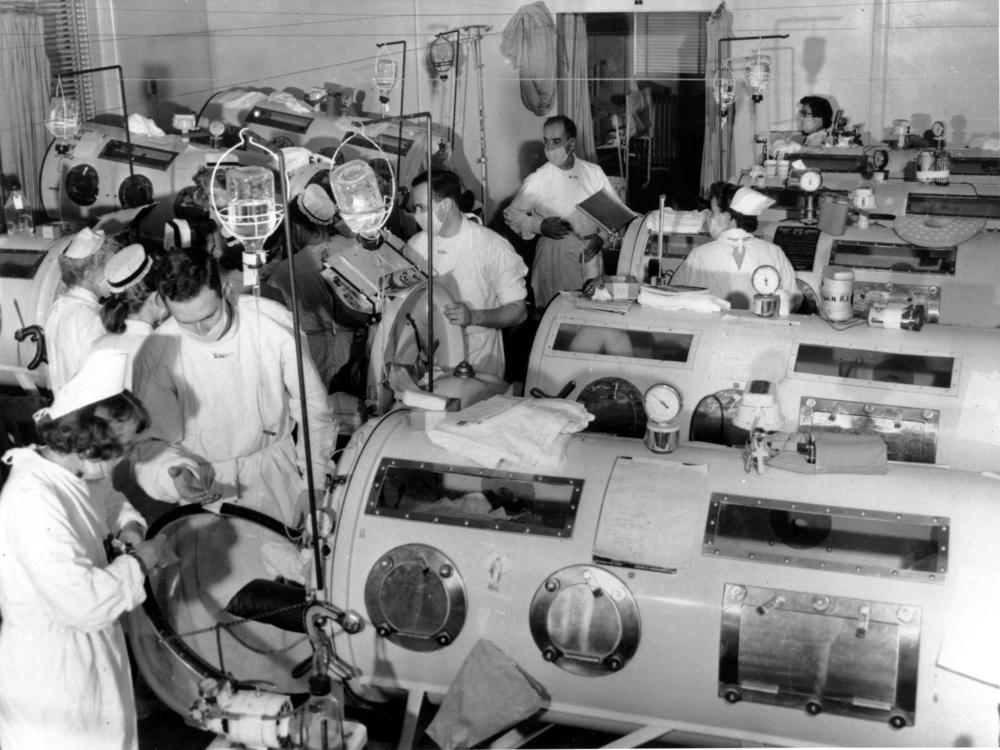Section Branding
Header Content
Paul Alexander, forced into an iron lung by polio in 1952, dies at 78
Primary Content
Polio struck Paul Alexander in 1952, when he was just 6 years old. Within days, the disease robbed him of the use of his body. But he fought through the illness, using an iron lung for more than 70 years — and inspiring people with his determination to live a full life. He painted, wrote a book and worked for years as an attorney.
"Paul took a lot of pride in being a positive role model for others," his friend Christopher Ulmer, who organized a GoFundMe page for Alexander in 2022, said in a message to NPR. "More than anything I believe he would want others to know they are capable of great things."
Alexander died on Monday at age 78, according to a notice by the Grove Hill Funeral Home & Memorial Park in his hometown of Dallas, Texas.
Ulmer says he first met Alexander when he filmed an interview with him; the two stayed in touch afterward. Ulmer launched a donation campaign for Alexander after people betrayed his trust and left him in need of better living accommodations, he said. In response, people donated more than $140,000.
"It allowed him to live his last few years stress-free," Alexander's brother, Philip, said in a statement shared by Ulmer. "It will also pay for his funeral during this difficult time. It is absolutely incredible to read all the comments and know that so many people were inspired by Paul. I am just so grateful."
The man in the iron lung, living a large life
Alexander contracted polio during the worst years of the U.S. outbreak, a time when hospital wards held row after row of children lying in iron lungs — seven-foot-long cylinders that use negative pressure and bellows to draw air into their lungs.
The disease progressed quickly in Alexander, shutting his young body down in a matter of days. He survived thanks to a last-minute tracheotomy; from there, he set out to push beyond the limits of his condition. Holding a rod in his mouth, he was able to turn pages in books and create art. He went to high school, college and law school — and, later in life, he used a rod to type out words on a keyboard to write his autobiography.
"My parents taught me to use my intelligence and my energy to be productive," Alexander said in a 2017 video by Gizmodo. "I've never thought of myself as a cripple. That's the word I choose to use because I think it covers the ground in most people's perceptions."
"I'm crippled in most people's minds, except mine," he said, adding later, "I'm Paul Alexander, human being."
He was eventually recognized by Guinness World Records as the longest-surviving iron lung patient.
At least one other American was known to be relying on an iron lung in recent years: Martha Lillard, who contracted polio one year after Alexander. Both of them were able to learn to breathe outside of the massive respirator for hours at a time, using a technique that required them to intentionally swallow air. But each night, they would return to the iron lung.
"I've tried all the forms of ventilation, and the iron lung is the most efficient and the best and the most comfortable way," Lillard told the Radio Diaries project.
The polio vaccine emerged in the 1950s
In 1955, the polio vaccine developed by Jonas Salk and his colleagues became an essential tool to fight the feared disease — and one for which Salk never sought a patent. It ended years of panic and fear.
"The first known polio outbreak in the United States was in Vermont in 1894," according to the Smithsonian Museum of American History. By the time Lillard and Alexander got sick in the early 1950s, polio epidemics had been growing worse and worse, with tens of thousands of new cases reported each year, often in the summer. Different people experienced differing symptoms, from a flu-like condition to a spreading paralysis.
"Communities reacted with dread because no one understood how or why people got it, and because children were the most frequently affected," the museum said, posting images showing closed playgrounds and signs barring children under age 16 from entering cities.
The U.S. officially eliminated "wild" transmission of polio in 1979, but sporadic cases have popped up over the years, including a 2022 case involving an unvaccinated traveler in Rockland County, N.Y.

